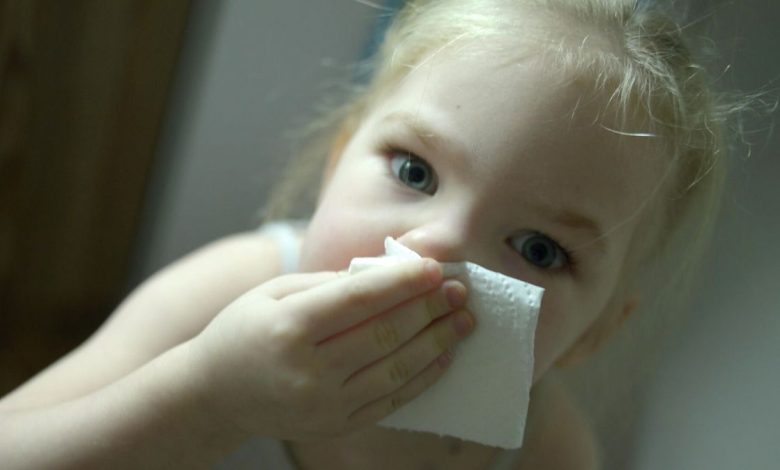Nasal congestion and runny nose in children: what is this, causes, symptoms, diagnostics, treatment, prevention

Stuffy or runny nose – children; Nose – congested; Congested nose; Runny nose; Postnasal drip; Rhinorrhea
Nasal congestion or runny nose is a common problem among children.. It arises, when the nasal passages become inflamed and swollen, which makes it difficult to breathe through the nose. The problem may also include nasal discharge or a "runny nose". If excess mucus runs down the back of the throat (postnasal congestion), it can cause cough or sore throat.
Causes of nasal congestion and runny nose in children
The most common cause of congestion or runny nose in children is a viral infection., such as a cold or flu. Other causes include allergies, sinus infections and airborne irritants, such as smoke or pollution.
Symptoms of nasal congestion and runny nose in children
Symptoms of congestion or runny nose in children may include:
- Nasal congestion
- Cold
- Sneezing
- Itching or tearing
- Cough
- Headache
- Sore throat
When to contact a healthcare professional
Parents should see a doctor, if their child:
- Heat (above 38.8°С)
- Labored breathing
- Severe headache or facial pain
- Symptoms, lasting more than 10 days
- Symptoms, which get worse after a few days
- Other symptoms, such as rashes, ear pain or vomiting.
Questions, that your doctor may ask
When you take your child to the doctor with a stuffy nose or runny nose, you may be asked the following questions:
- When did your child first have symptoms?
- What are your child's symptoms?
- Has your child been in contact with anyone, who has a cold or flu?
- Does your child have a history of allergies?
- Does your child have a history of sinus infections??
- Does your child have other symptoms?
Diagnosis of nasal congestion and runny nose in children
In most cases, a doctor can diagnose nasal congestion or a runny nose., examining the child's symptoms and medical history. In some cases, the doctor may conduct a physical examination, to check for signs of infection or inflammation.
Treatment of nasal congestion and runny nose in children
Treatment for nasal congestion or runny nose in children depends on the cause of the symptoms.. For viral infections, treatment may include rest, drinking plenty of fluids and over-the-counter medicines to relieve such symptoms, like pain, fever and nasal congestion.
For allergies, the doctor may prescribe antihistamines or recommend avoiding contact with the allergen. For bacterial sinus infections, your doctor may prescribe antibiotics..
Home treatment for nasal congestion and runny nose in children
Advice, to help babies and young children, include:
- Raise your child's headboard. Place a pillow under the head of the mattress. Or put books or boards under the legs at the head of the bed.
- Older children can drink more fluids, but these liquids must not contain sugar.
- You can use a humidifier, but avoid excessive moisture in the room. Clean the humidifier daily with bleach or disinfectant cleaner.
- You can also turn on the hot shower in the bathroom and bring your child there to breathe in the steam before bed..
Nasal irrigation can help remove mucus from your child's nose..
- Salt spray can be bought at a pharmacy or prepared at home.. To prepare it, use 1 glass (240 milliliters) warm water, 1/2 teaspoon (3 Gram) salt and a pinch of baking soda.
- Use mild saline nasal sprays 3 to 4 times a day.
If your child has an allergy:
- Your health care provider may also prescribe nasal sprays to treat allergy symptoms..
- Find Out, how to avoid triggers, that exacerbate allergies .
Nasal sprays are not recommended for children under the age of 2 years. Don't use over-the-counter nasal sprays more often, than 3 day of admission and 3 break day, unless directed by your doctor.
You can buy cough and cold medicines without a prescription. But they are often ineffective..
Prevention of nasal congestion and runny nose in children
To prevent congestion or runny nose in children, parents can:
- Encourage frequent hand washing
- Avoid contact with sick people
- Keep children away from cigarette smoke and other air pollutants
- Get your child vaccinated against the flu
- Practice respiratory hygiene, eg, cover your mouth and nose when coughing or sneezing.
Conclusion
Nasal congestion or runny nose is a common problem among children.. Although it may cause inconvenience, this is usually not a concern. Parents can help relieve their child's symptoms with home treatments and over-the-counter medications. If symptoms persist or worsen, parents should see a doctor.
Used sources and literature
Lopez SMC, Williams JV. Rhinoviruses. In: Kliegman RM, St. Geme JW, Bloom NJ, Shah SS, Tasker RC, Wilson KM, eds. Nelson Textbook of Pediatrics. 21st ed. Philadelphia, PA: Elsevier;2020:chap 290.
McGann KA, Long SS. Respiratory tract symptom complexes. In: Long SS, Prober CG, Fischer M, eds. Principles and Practice of Pediatric Infectious Diseases. 5th ed. Philadelphia, PA: Elsevier; 2018:chap 21.
Milgrom H, Safer SH. Allergic rhinitis. In: Kliegman RM, St. Geme JW, Bloom NJ, Shah SS, Tasker RC, Wilson KM, eds. Nelson Textbook of Pediatrics. 21st ed. Philadelphia, PA: Elsevier;2020:chap 168.
